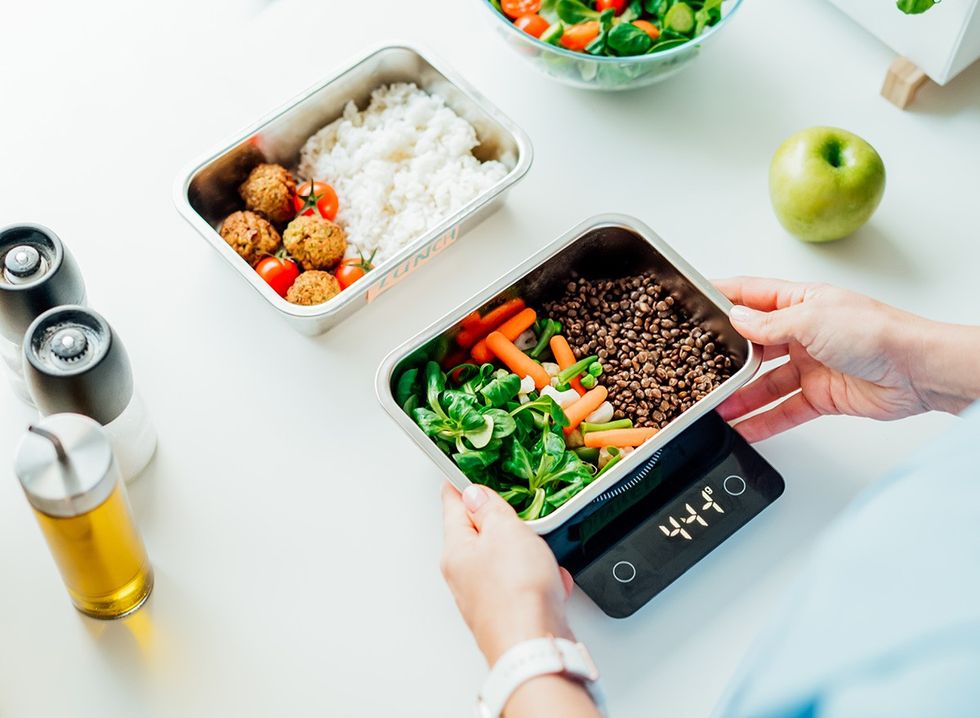Ever found yourself mindlessly munching on chips, unable to stop even when you're no longer hungry? You're not alone. Processed foods are designed to be addictive, making it challenging to break free from their grip. Lacey Baier, a nutrition and fitness coach behind a popular YouTube channel, understands this struggle firsthand. After losing over 250 pounds and maintaining her weight loss, Lacey now shares her "cleanish" approach to health—a balanced, sustainable lifestyle that prioritizes nutrition without sacrificing enjoyment. Read on to discover how cutting processed foods can transform your health and learn practical tips to make this positive change in your own life.
Understand What Processed Foods Really Are
Before diving into the effects of quitting processed foods, it's crucial to understand what they are. According to the U.S. Department of Agriculture (USDA), processed foods are defined as "any raw agricultural commodity subjected to washing, cleaning, milling, cutting, chopping, heating, pasteurizing, blanching, cooking, canning, freezing, drying, dehydrating, mixing, packaging, or other procedures that alter the food from its natural state."
RELATED: This Plan Is How to Lose 5 Percent Body Fat In 2 Weeks
Recognize the Hidden Dangers of Ultra-Processed Foods
"Most of us know that canned and processed foods can have a negative impact on our bodies, but I don't think a lot of us recognize and understand the extent of what processed foods can do to us," Lacey explains in her post.
She cites a study from the University of Sao Paulo that defines ultra-processed foods as those that are manufactured with added ingredients and are extremely modified. Examples include sodas, chips, milk chocolates, candy, ice cream, cereal, crackers, packaged soups, and chicken nuggets.
Identify the Different Types of Processed Foods
The NOVA classification system, introduced in 2009, offers a more nuanced approach to categorizing processed foods. It identifies four groups: unprocessed or minimally processed foods, processed culinary ingredients, processed foods, and ultra-processed foods. Each category represents a different level of processing, with ultra-processed foods being the most heavily modified.
Understand Why Processed Foods Are So Addictive
Lacey points out the addictive nature of processed foods: "Have you ever just been eating a bag of chips and couldn't stop? That's because processed foods kind of do a number on your brain." She explains that these foods are typically high in sugar, fat, and added chemicals, making them highly addictive. Moreover, they lack essential nutrients, providing empty calories that leave your body craving more.
RELATED:I'm a Nutritionist and Here Are 19 Protein Truths You Need to Hear
Recognize the Health Risks Associated with Processed Foods
While not all processed foods are harmful, certain types – particularly ultra-processed foods – have been linked to health concerns. The Harvard Health report states that "Processed foods are suggested to contribute to the obesity epidemic and the rising prevalence of chronic diseases like heart disease and diabetes." Ultra-processed foods often contain high levels of sodium, added sugars, and saturated fats. Moreover, extensive processing can lead to nutrient loss, as "nutrients can be destroyed or removed" during the manufacturing process.
Choose Nutrient-Dense Alternatives
"Let's talk about the foods that are a great choice to add to your diet that will hopefully replace some of those more processed foods," Lacey suggests. She recommends focusing on fresh fruits and vegetables, eggs, lean meats, seafood, beans, herbs, legumes, spices, whole grains, full-fat dairy, nuts, and seeds. These nutrient-dense options are filling and provide the body with necessary fiber, protein, and healthy fats.
Make Healthier Food Swaps
The Harvard Health experts recommend practical swaps for a healthier diet: "Look for breads that include whole grain flour as the main ingredient (it should be listed first) and that contain minimal additives and preservatives. Swap out butter spreads for mashed avocado or nut/seed kinds of butter." Other suggested substitutions include whole apples instead of processed apple products, steel-cut or rolled oats instead of instant flavored oatmeal, and natural peanut butter (made with only peanuts and salt) instead of varieties with added sugar and emulsifiers.
Experience the Benefits of Cutting Out Processed Foods
Lacey shares the positive changes you can expect when reducing processed foods in your diet:
- Improved focus and concentration
- Reduced headaches
- Less bloating
- Better mood
- Improved sleep quality
- Enhanced digestion
- Clearer skin
- Fewer uncontrollable cravings
"Personally, I've seen dramatic changes in my weight, attitude, health, complexion, and overall sense of wellbeing, the more that I have removed processed foods from my diet," Lacey reveals.
RELATED: I'm 70 But Look 40 Thanks to These 9 Diet Secrets
Embrace the Transition Period
Lacey advises that the process of cutting out processed foods may have some initial challenges. "Truthfully, it might get a little bit worse before it gets better," she warns. You might experience irritability, fatigue, or increased hunger for about a week. However, she encourages persistence, reminding us that these are signs of the body adjusting to healthier habits.
Adopt a Gradual Approach to Change
"I don't recommend just throwing out all processed foods from the house and never having them again," Lacey suggests. Instead, she recommends a more reasonable approach: use up what you have and then replace it with healthier alternatives. This gradual transition allows for sustainable change and helps your body adjust to new eating habits.
Lacey concludes with an encouraging message: "This is your opportunity to start giving your body the fuel that it needs, and it will thank you, I promise you." By making conscious choices to reduce processed foods and embrace whole, nutrient-dense alternatives, you're taking a significant step towards improved health and wellbeing. And if you enjoyed this article, take advantage of these 15 Quick Ways to Lose Body Fat Percentage in a Week.














 Shutterstock
Shutterstock
 Shutterstock
Shutterstock Shutterstock
Shutterstock
 Shutterstock
Shutterstock Shutterstock
Shutterstock Shutterstock
Shutterstock
 Shutterstock
Shutterstock Shutterstock
Shutterstock Shutterstock
Shutterstock Shutterstock
Shutterstock Shutterstock
Shutterstock

 Shutterstock
Shutterstock Shutterstock
Shutterstock Shutterstock
Shutterstock Shutterstock
Shutterstock Shutterstock
Shutterstock Shutterstock
Shutterstock Shutterstock
Shutterstock Shutterstock
Shutterstock Shutterstock
Shutterstock Shutterstock
Shutterstock Shutterstock
Shutterstock
 Shutterstock
Shutterstock Shutterstock
Shutterstock Shutterstock
Shutterstock Shutterstock
Shutterstock Shutterstock
Shutterstock Shutterstock
Shutterstock Shutterstock
Shutterstock Shutterstock
Shutterstock Shutterstock
Shutterstock

 I'm a Nutritionist and These 9 High-Protein Snacks Keep My Clients Full While Losing 50 Pounds
I'm a Nutritionist and These 9 High-Protein Snacks Keep My Clients Full While Losing 50 Pounds
 Shutterstock
Shutterstock 2. Processed FoodsShutterstock
2. Processed FoodsShutterstock Shutterstock
Shutterstock Shutterstock/Prostock-studio
Shutterstock/Prostock-studio Shutterstock
Shutterstock Pro TipsShutterstock
Pro TipsShutterstock Shutterstock
Shutterstock Shutterstock
Shutterstock Shutterstock
Shutterstock Shutterstock
Shutterstock Don’t Drink as Much AlcoholShutterstock
Don’t Drink as Much AlcoholShutterstock Most Women on GLP-1s Are Making a Few Common MistakesShutterstock
Most Women on GLP-1s Are Making a Few Common MistakesShutterstock Soda and Sugary DrinksShutterstock
Soda and Sugary DrinksShutterstock Shutterstock
Shutterstock Eat BreakfastShutterstock
Eat BreakfastShutterstock And Improve Insulin SensitivityShutterstock
And Improve Insulin SensitivityShutterstock Belly Flab Strip Tip: Sugar and Fat Calories Leave Its Mark on Your BodyShutterstock
Belly Flab Strip Tip: Sugar and Fat Calories Leave Its Mark on Your BodyShutterstock Shutterstock
Shutterstock The Drugs Mimic the GLP-1 Hormone Naturally Produced by the BodyShutterstock
The Drugs Mimic the GLP-1 Hormone Naturally Produced by the BodyShutterstock 3. Deep-Fried ItemsShutterstock
3. Deep-Fried ItemsShutterstock